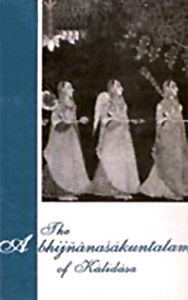Kalidasa had penned down three plays. Among them, `Abhijnanasakuntalam` ("The Recognition of Shakuntala") is universally regarded as the masterpiece. It was among the first Sanskrit works to be translated into English and has subsequently been translated into several other foreign languages. Kalidasa`s other plays include - Malavikagnimitra ("Malavika and Agnimitra") and Vikramorvasiya ("Pertaining to Vikrama and Urvashi").
 Abhijnanasakuntalam ("The Recognition of Shakuntala") speaks about the story of King Dushyanta. While in a hunting trip, he met Shakuntala, the adopted daughter of a sage and was tied in nuptial ties. However, a misfortune befell them when he is called upon to court: Shakuntala, pregnant with their child, unknowingly outrages a visiting sage and invites a curse, by which Dushyanta would forget her entirely until he encounters the ring he had left with her. On her trip to Dushyanta`s court in an advanced stage of pregnancy, as an act of blunder, she misplaces the ring and has to come away dejected and unrecognised. The ring is discovered by a fisherman who recognises the royal seal and returns it to Dushyanta. He retrieves his memory of Shakuntala and sets forth to find her. After more exertions and travails, they are finally reunited.
Abhijnanasakuntalam ("The Recognition of Shakuntala") speaks about the story of King Dushyanta. While in a hunting trip, he met Shakuntala, the adopted daughter of a sage and was tied in nuptial ties. However, a misfortune befell them when he is called upon to court: Shakuntala, pregnant with their child, unknowingly outrages a visiting sage and invites a curse, by which Dushyanta would forget her entirely until he encounters the ring he had left with her. On her trip to Dushyanta`s court in an advanced stage of pregnancy, as an act of blunder, she misplaces the ring and has to come away dejected and unrecognised. The ring is discovered by a fisherman who recognises the royal seal and returns it to Dushyanta. He retrieves his memory of Shakuntala and sets forth to find her. After more exertions and travails, they are finally reunited.
Malavikagnimitra ("Malavika and Agnimitra") speaks about the story of King Agnimitra, who falls in love with the picture of a deported servant girl named Malavika. When the queen chances upon her husband`s ardour for this girl, she turns maddened and has Malavika incarcerated. However, with twists of fate and luck, Malavika turns out to be a trueborn princess, thus legalising the affair.
Vikramorvasiya ("Pertaining to Vikrama and Urvashi") speaks about the story of mortal King Pururavas and ethereal nymph Urvashi, who fall in love. As an immortal, she has to return to the heavens, where an untoward accident causes her to be hurled back to the earth as a mortal. Urvashi is also cursed that she will die (and hence return to heaven) the instant her lover sets his eyes on the child whom she will bear him. After a sequence of misadventures, including Urvashi`s transient transformation into a vine, the curse is lifted and the lovers are granted to remain together on the earth.



















